|
|
|
Sort Order |
|
|
|
Items / Page
|
|
|
|
|
|
|
| Srl | Item |
| 1 |
ID:
149622
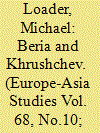

|
|
|
|
|
| Summary/Abstract |
In their battle to succeed Stalin in 1953, Lavrentii Beria and Nikita Khrushchev temporarily cooperated to launch an indigenising nationality policy in the Soviet Republics to compete for support among the non-Russian nationalities. The impact of this little known collaboration was the ‘New Course’ for the Soviet periphery. This essay examines the ‘New Course’ and its repercussions in Latvia. Moscow struggled to control the programme after it unleashed a wave of anti-Russian sentiment. With encouragement from nationalists in the Latvian leadership, Russian cadres were ousted from leading Party and government positions, sent back to Russia and replaced by ethnic Latvians.
|
|
|
|
|
|
|
|
|
|
|
|
|
|
|
|
| 2 |
ID:
152912
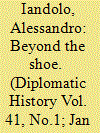

|
|
|
|
|
| Summary/Abstract |
History tends to remember Soviet participation at the Fifteenth Session of the United Nations General Assembly (UN GA, September 1960–April 1961) because of Nikita Khrushchev’s shoe. On October 13, 1960, the Soviet leader allegedly banged his shoe against his desk in the General Assembly hall to protest a speech he did not like.1 The incident is among the most well known in the history of the Cold War. However, despite the interest it has generated, Khrushchev’s conduct was the least important aspect of Soviet relations with the UN in 1960–61. This article reassesses Soviet participation at the Fifteenth Session of the GA in light of its medium- and long-term consequences for UN structure, practices, and vision. It also brings the issue of Moscow’s relations with UN members from the Third World, until now overlooked in the existing literature, into the story of this UN session.
|
|
|
|
|
|
|
|
|
|
|
|
|
|
|
|
| 3 |
ID:
105091
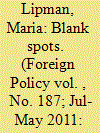

|
|
|
|
|
| Publication |
2011.
|
| Summary/Abstract |
In 1992, barely a year after the collapse of the USSR, three Russian lawyers were granted unprecedented access to the holy of holies -- the minutes of the Politburo, the Soviet Communist Party's highest body. President Boris Yeltsin was anxious to secure his political triumph by seeking to outlaw the Communist Party, and his lawyers were entrusted with using the historical records to prepare his case before the newly formed Constitutional Court.
|
|
|
|
|
|
|
|
|
|
|
|
|
|
|
|
| 4 |
ID:
038695
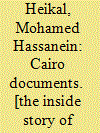

|
|
|
|
|
| Publication |
New York, Doubleday and company, 1973.
|
| Description |
xxxv, 360p.Hbk
|
| Standard Number |
0385064470
|
|
|
|
|
|
|
|
|
|
|
|
Copies: C:1/I:0,R:0,Q:0
Circulation
| Accession# | Call# | Current Location | Status | Policy | Location |
| 012229 | 923.162/HEI 012229 | Main | On Shelf | General | |
|
|
|
|
| 5 |
ID:
122827
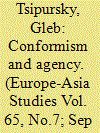

|
|
|
|
|
| Publication |
2013.
|
| Summary/Abstract |
This essay examines newspaper narratives depicting model youth in Komsomol'skaya Pravda in the early 1960s in order to cast light on the Party-state's efforts in the Khrushchev years to use the press as a means of re-energising the drive to forge model communist citizens. In contrast to most studies of Soviet media, this study offers a glimpse of the reception of official signals, by drawing on sociological studies that Komsomol'skaya Pravda conducted of its readers in the early 1960s. Throughout, the paper explores recent scholarly discussions of resistance, conformism and agency in the Soviet context.
|
|
|
|
|
|
|
|
|
|
|
|
|
|
|
|
| 6 |
ID:
117430
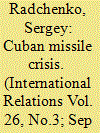

|
|
|
|
|
| Publication |
2012.
|
| Summary/Abstract |
This article reviews major issues in the historiography of the Russian/Soviet side of the Cuban missile crisis, as it has developed since the early 1990s. Focusing on key works, including Fursenko and Naftali's One Hell of a Gamble and Mikoyan's Anatomi'ia Karibskogo Krizisa, the article explores three issues: why Nikita Khrushchev decided to send missiles to Cuba, why he resolved to withdraw them, and how close the world came to 'the brink'. The author contends that in our understanding of the Kremlin's motivations in the Cuban missile crisis, we have come to over-rely on disparate pieces of 'evidence', which, at closer investigation, turn out to be one-sided, undocumented, or demonstrably false. The author therefore urges caution in drawing far-reaching conclusions from the crisis, especially in projecting its uncertain lessons onto the broader scholarship on the Soviet decision making during the Cold War.
|
|
|
|
|
|
|
|
|
|
|
|
|
|
|
|
| 7 |
ID:
113620
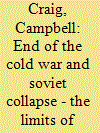

|
|
|
|
|
| Publication |
2012.
|
| Summary/Abstract |
William Wohlforth and Daniel Deudney and John Ikenberry provide strong Realist and Liberal analyses, respectively, of the End of the Cold War. Both interpretations, however, beg larger conceptual and historical questions, which cannot be answered without making the nuclear revolution central to explaining Soviet collapse.
|
|
|
|
|
|
|
|
|
|
|
|
|
|
|
|
| 8 |
ID:
117431
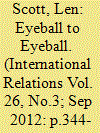

|
|
|
|
|
| Publication |
2012.
|
| Summary/Abstract |
The role of American intelligence in the Cuban missile crisis is crucial to understand perceptions and judgements of key actors in October 1962. Dino Brugioni's Eyeball to Eyeball provides a detailed 'insider's' account that combines memoir and history. It focuses on the role of aerial intelligence, which was vital to how the crisis was managed in Washington. Brugioni's account also provides a representation of events that explores both military/operational aspects and political decision-making in Washington, most importantly that of President John F. Kennedy. Brugioni argues that it was a victory for Kennedy and for America. Twenty years of scholarship and revelation has challenged this conclusion, which this article examines. Likewise, the idea that the crisis marked a notable success for the Central Intelligence Agency (CIA) is revisited in the light of new information and assessments.
|
|
|
|
|
|
|
|
|
|
|
|
|
|
|
|
| 9 |
ID:
026687
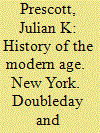

|
|
|
|
|
| Publication |
New York, Doubleday and company, Inc., 1972.
|
| Description |
xiii, 462p.Pbk
|
|
|
|
|
|
|
|
|
|
|
|
Copies: C:1/I:0,R:0,Q:0
Circulation
| Accession# | Call# | Current Location | Status | Policy | Location |
| 011366 | 909.08/PRE 011366 | Main | On Shelf | General | |
|
|
|
|
| 10 |
ID:
163141
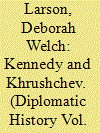

|
|
|
|
|
| Summary/Abstract |
Despite his cold war rhetoric, John F Kennedy wanted to improve US Soviet realtions after he took office in January 1961. In his inaugral address, Kennedy suggested that they "begin anew the quest for peace". After only a month, Kennedy invited Nikita S Khrushchev to an informal summit meeting, believing that the Soviet leader would appreciate this gesture of respect.
|
|
|
|
|
|
|
|
|
|
|
|
|
|
|
|
| 11 |
ID:
044688
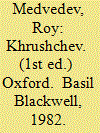

|
|
|
|
|
| Edition |
1st ed.
|
| Publication |
Oxford, Basil Blackwell, 1982.
|
| Description |
xi, 292p.hbk
|
| Standard Number |
0631129936
|
|
|
|
|
|
|
|
|
|
|
|
Copies: C:1/I:0,R:0,Q:0
Circulation
| Accession# | Call# | Current Location | Status | Policy | Location |
| 021912 | 947.08520924/MED 021912 | Main | On Shelf | General | |
|
|
|
|
| 12 |
ID:
163140


|
|
|
|
|
| Summary/Abstract |
What are the risks to global security when a disrupter rises to lead a nuclear armed superpower? Imagine a leader who publicly vows "to smach in the teeth"; or who issues an off-hand nuclear threat to a foreign adversary while talking to a group of school teachers, saying "we have rockets which can land precisely at a preset traget 13,000 kilometers away.
|
|
|
|
|
|
|
|
|
|
|
|
|
|
|
|
| 13 |
ID:
042646


|
|
|
|
|
| Publication |
London, Sydney, 1984.
|
| Description |
243p.hbk
|
| Standard Number |
0709917899
|
|
|
|
|
|
|
|
|
|
|
|
Copies: C:1/I:0,R:0,Q:0
Circulation
| Accession# | Call# | Current Location | Status | Policy | Location |
| 024531 | 947.0852/MIL 024531 | Main | On Shelf | General | |
|
|
|
|
| 14 |
ID:
038549


|
|
|
|
|
| Publication |
London, Hutchinson, 1990.
|
| Description |
xxi, 773p.Hbk
|
| Standard Number |
0091746361
|
|
|
|
|
|
|
|
|
|
|
|
Copies: C:1/I:0,R:0,Q:0
Circulation
| Accession# | Call# | Current Location | Status | Policy | Location |
| 032808 | 920.7147/SAK 032808 | Main | On Shelf | General | |
|
|
|
|
| 15 |
ID:
038718


|
|
|
|
|
| Publication |
London, Macmillan, 1972.
|
| Description |
viii, 504p.Hbk
|
| Standard Number |
333124111
|
|
|
|
|
|
|
|
|
|
|
|
Copies: C:1/I:0,R:0,Q:0
Circulation
| Accession# | Call# | Current Location | Status | Policy | Location |
| 010106 | 923.241/MAC 010106 | Main | On Shelf | General | |
|
|
|
|
| 16 |
ID:
048836
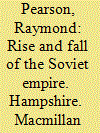

|
|
|
|
|
| Publication |
Hampshire, macmillan Press, 1998.
|
| Description |
xix, 194p.Hbk
|
| Standard Number |
0333606272
|
|
|
|
|
|
|
|
|
|
|
|
Copies: C:1/I:0,R:0,Q:0
Circulation
| Accession# | Call# | Current Location | Status | Policy | Location |
| 039493 | 947.084/PEA 039493 | Main | On Shelf | General | |
|
|
|
|
| 17 |
ID:
027890


|
|
|
|
|
| Publication |
New York, Prederick & publishers, 1965.
|
| Description |
viii, 267p.hbk
|
| Series |
Praeger Publications in Russian History and World Communism, no.14
|
|
|
|
|
|
|
|
|
|
|
|
Copies: C:1/I:0,R:0,Q:0
Circulation
| Accession# | Call# | Current Location | Status | Policy | Location |
| 000167 | 947.0853/CON 000167 | Main | On Shelf | General | |
|
|
|
|
| 18 |
ID:
117426


|
|
|
|
|
| Publication |
2012.
|
| Summary/Abstract |
The Cuban missile crisis remains one of the most intensely studied events of the twentieth century, and which engages the attention of scholars from a variety of disciplines. Lessons learned by American practitioners and academics contributed to the conduct of American foreign policy in the 1960s and to academic understanding of nuclear deterrence, nuclear crises and crisis management in general. Nearly 50 fifty years of scholarship have generated new insights and understanding. From the 1980s, study of what in Moscow was termed the Caribbean crisis was informed by access to Soviet officials and Soviet archives, and became the forefront of the 'new historiography' of the Cold War. This collection reviews how various texts inform our understanding and how new interpretations and/or new sources of information have overtaken (or indeed validated) the original analysis. This article provides an overview of this endeavour and an answer to the question of whether we should continue to study the Cuban missile crisis.
|
|
|
|
|
|
|
|
|
|
|
|
|
|
|
|
| 19 |
ID:
147951


|
|
|
|
|
| Summary/Abstract |
This article explores the emergence of Chernogolovka, a scientific town near Moscow, during Khrushchev’s thaw. Nikolai Semenov, the founder of the town, relied on the Khrushchev regime’s fascination with modern science, its interest in expanding the scientific enterprise, and the more relaxed atmosphere of the thaw to transform what the Soviet state intended to be a military testing ground into a renowned scientific centre. This case study demonstrates that there was space for individual initiatives in the post-Stalinist system, as long as they came from well-connected individuals and conformed to the political and ideological objectives of the state.
|
|
|
|
|
|
|
|
|
|
|
|
|
|
|
|
| 20 |
ID:
027324
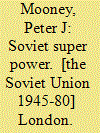

|
|
|
|
|
| Publication |
London, Heinemann Educational Books., 1982.
|
| Description |
vii, 210p.hbk
|
| Standard Number |
043531601X
|
|
|
|
|
|
|
|
|
|
|
|
Copies: C:1/I:0,R:0,Q:0
Circulation
| Accession# | Call# | Current Location | Status | Policy | Location |
| 020167 | 947.085/MOO 020167 | Main | On Shelf | General | |
|
|
|
|
|
|
|
|
|